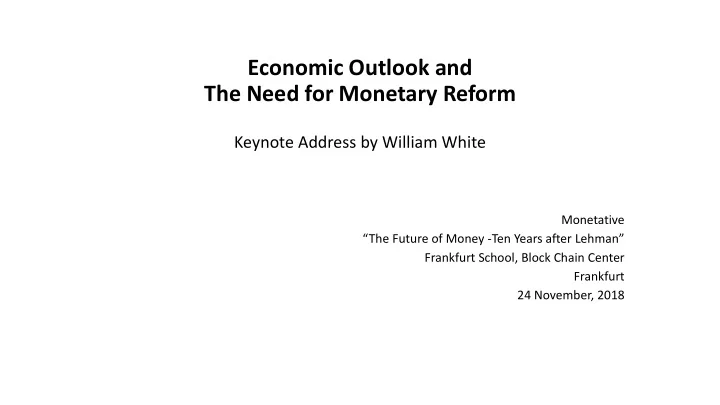

Economic Outlook and The Need for Monetary Reform Keynote Address by William White Monetative “The Future of Money - Ten Years after Lehman” Frankfurt School, Block Chain Center Frankfurt 24 November, 2018
Public Policy in the Lead Up to the Crisis of 2007 • Demographics, the “fall of the wall” and global disinflation • Fiat money and irrational exuberance in AME’s • Inadequately resisted by fiscal, monetary and regulatory policies • Leading to real and financial “imbalances” • Spreading to EME’s via semi -fixed exchange rates • The trigger event in a complex, adaptive world ; “sub - prime”
Public Policy in the Post-Crisis Period • Monetary and non-monetary policies resisted the downturn • Quick recognition of downsides to non-monetary policies • Regulatory policies tightened • Leaving monetary policy as “the only game in town” • Increasingly inventive but essentially “more of the same” • Yet failing to lift aggregate demand as expected. • As Keynes himself predicted
Monetary Policy Has Led to Still More “Imbalances” • Global debt ratio 40 percentage points higher than pre crisis • With EME corporates now exposed as well • Asset prices at unsustainable levels? • Risks of financial instability have risen • Compounded by structural developments affecting finance • Perhaps contributing to the slow down in productivity growth
New Regulations Insufficient to Ensure Even Financial Stability • Microprudential regulations have been significantly tightened • Yet, grounds for belief that the financial sector remains fragile • Macroprudential policies not directed to restraining the credit cycle • And suffer many other shortcomings • In short, we are not in a good place
Where to From Here? • Demographics and rising “imbalances” support monetary tightening • But existing “imbalances” imply this is risky; the debt trap? • Moreover, every major region has economic and political problems • And problems anywhere will become problems everywhere • Hoping “this time is different” but preparing for the worst? • What should policymakers do to when the next crisis hits?
Or Do We Need a New Monetary System? • George Selgin and “Free Banking” • Larry Kotlikof and “ Limited Purpose Banking” • The Chicago School and “Narrow Banking” • Jonathon McMillan and “The End of Banking” • The international dimension: from Non-System to System
A Postscript on Complexity • Analytical shortcomings of economic models • The domestic economy as a complex adaptive system • The global economy as a complex system of complex systems • Fundamental lessons suggested for policymakers • The need for a “paradigm shift”
And Why it Has Not Happened • Muddling though rather than thinking big thoughts • Paradigm shifts in normal times • The retreat into “false beliefs” in abnormal times • Cast the blame on others, both domestically and internationally • Will the coming crisis bring the needed paradigm shift?
Could Improvements to the Current Monetary System Avoid Future Debt Crises? • Coordinated resistance to “lean” against credit bubbles? • More symmetric use of monetary and fiscal policies? • Improve self discipline and market discipline in the financial sector? • End interest deductibility and limited liability banking? • Roll back globalisation, securitization and consolidation?
Recommend
More recommend